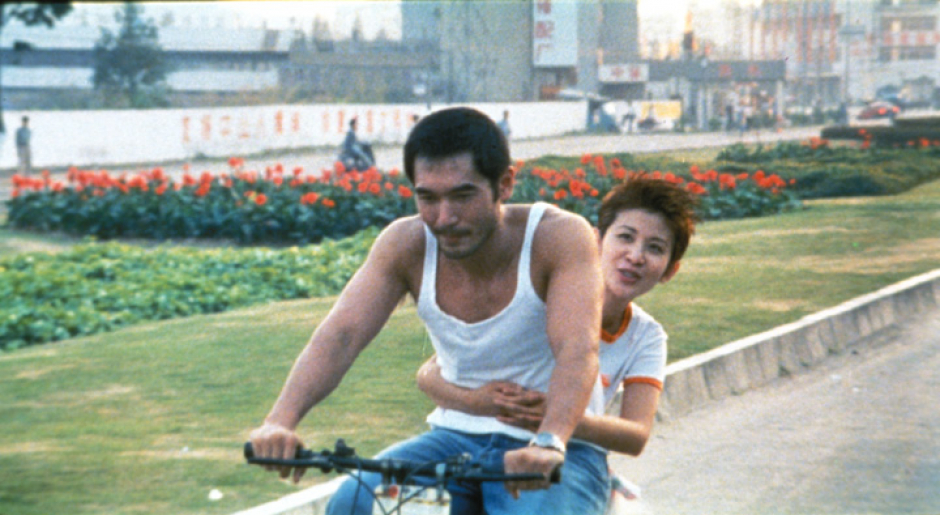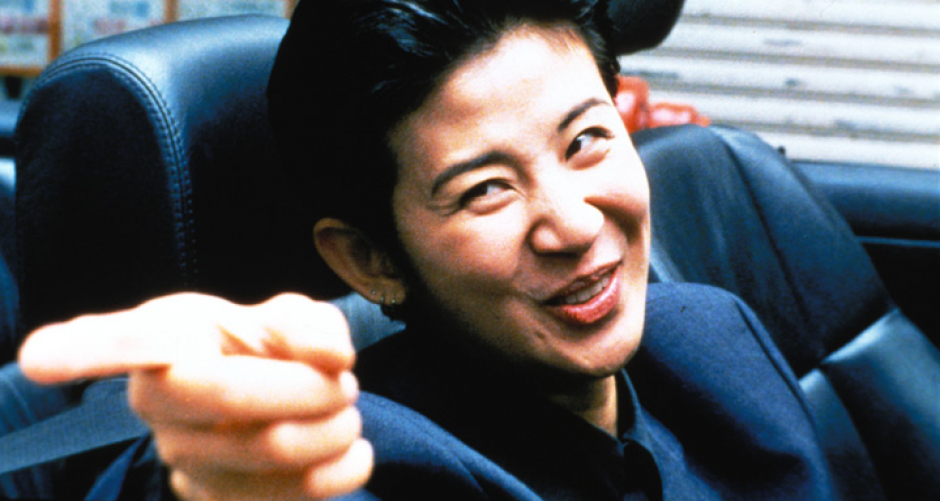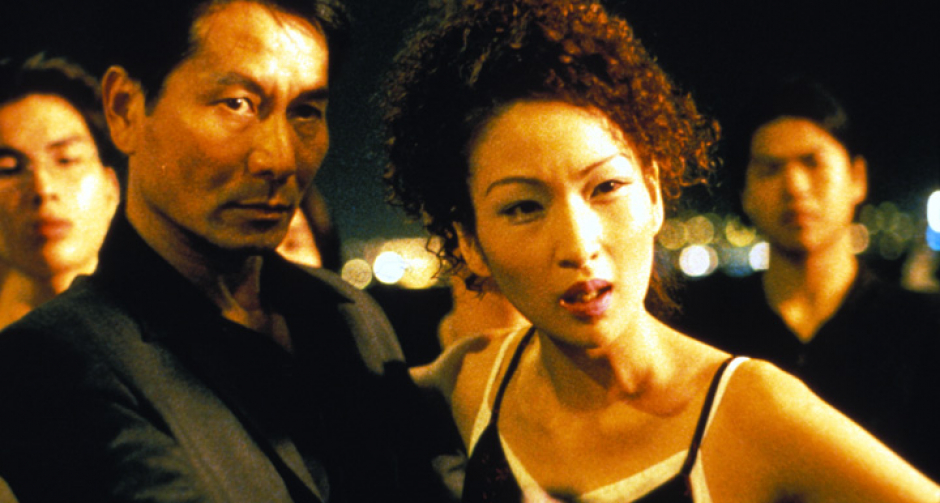CRIME: Hong Kong Style season, HOME, February 4 – April 7, 2016
HOME’s ambitious season Crime: Hong Kong Style featured some twenty films over the course of two months, including films ranging from forgotten classics like The Swallow Thief, to international blockbusters such as Police Story, to several UK premieres. The season can be judged a real success simply for bringing so many Hong Kong films to the big screen in Manchester: but in doing so, the season draws attention to just how interesting Hong Kong cinema is.
One of the real pleasures of the season was to see the enormous stylistic range that can be included within the broad category of ‘crime’ cinema, a diversity that was especially clear at the beginning and ends of the season. The opening moved between almost comically contrasting choices: the neon romance of Wong Kar-Wai’s classic As Tears Go By (1988), the premiere of Ringo Lam’s slick and fast-moving Wild City (2015), the artful kung fu of The Boxer from Shantung (1972), and hilarious slapstick comedy The Pilferer’s Progress (Money Crazy) (1977). Towards the end of the season, any expectations of the crime genre were turned on their heads: by Too Many Ways to Be No. 1 (1997), whose unsettling camerawork and narrative layers were astonishing; Portland Street Blues (1998), with its unconventional take on gender politics; and Election (2005), whose polished appearances belies constant surprises.
Over the course of the season, it was interesting to see the way trends of violence and special effects changed. Watching films like The Boxer from Shantung (1972) and The Killer Constable (1980), it is easy to feel strangely invested in the outcome of 15 minute kung fu fight scenes: as phoney as the blood is, there is little false about the tremendous skill and talent of the actors. In more recent films the violence is more brutal and less artful: in 2014’s Overheard 3 (2014), a protagonist beats his ‘brother’ to death with breezeblocks in the construction site at the centre of their corrupt land deals; and when in Portland Street Blues Sister Thirteen’s father is killed by endless stomps to the head from rival gang leader Brother S.O.B., the floor-level camera catches it all in bone-crunching detail until he finally blacks out. The urge for constant adrenalin also takes the form of long, high-speed car chases, particularly in Alan Mak and Felix Chong’s Overheard trilogy (2009 – 2014), or the pivotal car crash which sets the events of Beast Stalker (2008) in motion. The genre’s fascination with cars gives us one of the most satisfying moments of recognition in modern cinema, when the corrupt gangster Will Ma (Michael Wong) in Overheard is driven in balletic slow motion from a suspension bridge into the sea by the film’s wronged hero, presumed dead. There is similarly a strange grace in the way cars open us up to see an enormous array of locations: and perhaps, in a city with terrible traffic and spectacularly efficient public transport, there is something especially thrilling about the fast cars and open roads of a film like Election (2005), careering quickly from Wan Chai to TST to the New Territories.
If the season as a whole had a downside, it was the weeks when films from a similar cultural moment were shown in rapid succession, diminishing the achievement of individual films. Felix Chong’s Once a Gangster (2010), was outstanding, in which a former convict tries in various ways to go straight, including a botched interview at Hong Kong University. Likewise, the identity-challenging plot twists of Infernal Affairs (2002), co-written by Chong, offers a deeply satisfying counterpart to its more-famous western adaptation in The Departed. Yet seen among Chong’s three Overheard films, the similarities tend to overwhelm what is really unique in each one.
The idiom of these Felix Cheung films exemplifies the Hong Kong film industry as one that is unashamed of being an industry: whatever turns out to be popular will be re-used and re-used until audiences get bored. There is nothing with this in itself, but one downside of the industrial approach is gender politics, and many films were united by a regretably dated treatment of female characters, often reducing women to little more than props. If the beautiful young girl in a bikini fawning over a portly middle-aged man on a yacht at the start of Pilferer’s Progress wasn’t bad enough, the bizarrely enthusiastic male attacks on half-clothed breasts in To Be Number One (1991) and Portland Street Blues (1998) shows how disturbingly women are cast off as part of the Triad lifestyle.
Yip Wai Man’s Portland Street Blues (1998) is one of the few films to really approach these issues, led by a cast of interesting and even flawed female characters. While Scarface’s treatment at the hands of her policeman lover approaches gratuitous violence, we at least experience it from her point of view. Most interesting about the film is the largely unsensationalised lesbianism of its female protagonist Sister Thirteen, played by Sandra Ng in a witty and nuanced performance of a character that could easily have fallen into unexamined cliché. If Thirteen’s butchness may be a necessary survival technique in the aggressively masculine world of the Triads, her relationship with her friend May (Kristy Yang) gestures towards a genuinely queer potential which refuses to fix the divisions between friendship and desire. The Swallow Thief (1961), similarly, centres on a young woman who falls in love with the Robin Hood-like Swallow Thief, only for him to captured and imprisoned by the corrupt official who is trying to seduce her. In order to rescue him, Yinniu employs her martial arts skills to become the Swallow Thief herself, with her grandfather’s help. The Swallow Thief might not make it far through the Bechdel test, but Yinniu is portrayed as a resourceful and determined young woman in a world of dishonest and incompetent men, effortlessly beating them at their own games.
One of the surprising political statements made by these films is their relation to language and culture. Hong Kong films are generally targeted at a Chinese-speaking Hong Kong audience: not the armies of Filipino maids that keep the city running, nor the European expats that luxuriate in monied bubbles. Yet in making this decision, the largely Chinese films do not simply exclude English – the coloniser’s language which remains very widely spoken and understood in the region – but represent the language in strange ways. One of the few examples of fluent English speech comes from the character Will Ma played by English monolingual Michael Wong in Overheard (2009), but here it is a language of flattering rhetoric, false promises, and concealed aggression. Alternatively, English is the language of humility before authority, as in the repeated ‘sorry sir’ of Kwok T-Man in Wild City. When Brother Bo returns regains a for a few desperate moments at the start of Too Many Ways to be Number One (1997), all he can say is the zombiefied recitation of a bizarre poem beginning ‘Lilly lost her looking glass’. If these Hong Kong crime films have little time for the language of colonial oppression, that language appears as a perverse, unstable, and unwelcome influence. Whether this is intentional or not, the localism of this cinema is manifest in relation to a defiance of non-local rule.
Laura Swift and Joel Swann
(Images from Portland Street Blues (1998))



